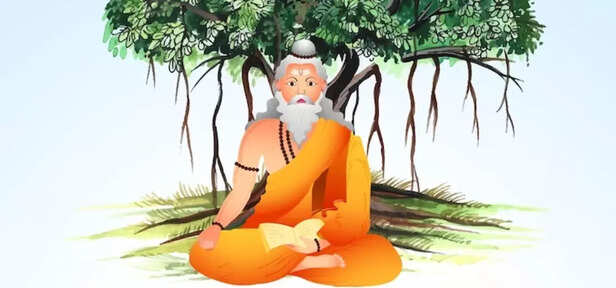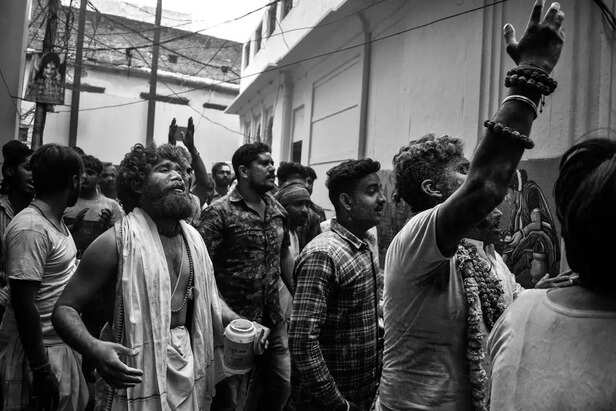No More Pujas, No More Aartis—Would Hinduism Still Be Hinduism?
Nidhi | Feb 25, 2025, 22:27 IST

( Image credit : Pexels )
Hinduism is deeply woven with rituals like pujas and aartis, but what if they disappeared? Would the religion still hold its essence, or would it lose its spiritual and cultural foundation? This thought-provoking article explores the significance of rituals in Hinduism, their historical and philosophical roots, and whether Hinduism can survive without them. By examining sacred texts, expert opinions, and evolving modern perspectives, we uncover whether rituals are the soul of Hinduism or just a practice that can evolve with time.
न कर्मणा न प्रजया धनेन त्यागेनैके अमृतत्वमानशुः।
(Not by rituals, nor by progeny, nor by wealth, but by renunciation alone one attains immortality – Mundaka Upanishad 3.2.3)
Hinduism is often seen as a religion of grand rituals—pujas, yajñas, aartis, and intricate temple ceremonies. From birth to death, every stage of life is marked by sacred observances. But at its philosophical core, Hinduism is not just about external practices; it is a pursuit of self-realization, as the Upanishads and Bhagavad Gita repeatedly emphasize.
This brings us to a fundamental question—can Hinduism exist without its rituals? If spirituality is an inward journey, are traditional customs necessary, or are they merely cultural embellishments? Can a Hindu be deeply spiritual without performing rituals? Or would the absence of rituals lead to the dilution of one of the world’s oldest traditions?
Let’s explore this intricate relationship between rituals and spirituality through ancient texts, philosophical perspectives, and the modern evolution of Hindu practices.
 Hindu rituals are not mere symbolic actions; they are designed as tools for spiritual discipline and societal harmony. Ancient texts like the Rigveda and Yajurveda describe rituals as a way to align human life with cosmic order (ṛta). For example:
Hindu rituals are not mere symbolic actions; they are designed as tools for spiritual discipline and societal harmony. Ancient texts like the Rigveda and Yajurveda describe rituals as a way to align human life with cosmic order (ṛta). For example:
These rituals serve a dual purpose—strengthening individual spirituality and reinforcing collective identity.
Despite the prominence of rituals, Hinduism also acknowledges that ultimate realization (moksha) is beyond them. The Bhagavad Gita (2.42-2.46) critiques excessive ritualism, warning against people who perform them only for material gains. Krishna advises Arjuna that wisdom (jnana yoga) and selfless action (karma yoga) are greater than ritualistic observances.

Similarly, the Upanishads often emphasize meditation and self-inquiry over external rituals. The Mundaka Upanishad (1.2.7-10) explicitly states that Vedic rituals, while useful, are like a "lower knowledge" that leads to temporary rewards, whereas true liberation comes from inner wisdom.
Historically, saints like Adi Shankaracharya, Ramana Maharshi, and Swami Vivekananda focused on jnana (knowledge) and bhakti (devotion), often minimizing the importance of external rituals.
Beyond personal spirituality, rituals serve as cultural anchors.
Imagine a Diwali without diyas, a Holi without colors, or a wedding without the sacred mangal pheras. Rituals bring communities together, preserving traditions across generations.

If rituals were to disappear, Hinduism might become an abstract philosophy rather than a lived tradition.
Modernization has altered how rituals are performed. Today, you can:
Does this adaptation dilute their spiritual power, or does it showcase Hinduism’s flexibility?
The Vedic tradition has always evolved—from oral hymns to written scriptures, from temple worship to household deities. This ability to change while retaining core values has ensured Hinduism’s survival for millennia.
Several reform movements have attempted to strip Hinduism of excessive rituals:

While these movements thrived, they didn’t entirely replace mainstream Hinduism, proving that rituals remain deeply embedded in its fabric.
Without rituals, would Hinduism lose its distinct identity? Would it still be recognizable, or would it merge into a broader, non-ritualistic spiritual movement?
6. The Verdict: A Balance Between Ritual and Realization
So, can Hinduism survive without rituals? The answer is nuanced.
Rather than choosing between ritual and philosophy, a balanced approach works best. A true seeker can perform rituals with understanding rather than blind adherence while also engaging in deep self-inquiry.
Perhaps the real question isn’t whether Hinduism needs rituals, but whether we need them. In a fast-paced world, rituals offer a sense of grounding, rhythm, and belonging. They help us pause, reflect, and connect—whether with the divine, our ancestors, or our inner selves.
So next time you light a diya, chant a shloka, or simply close your eyes in prayer, ask yourself—are you following tradition, or are you part of something timeless?
(Not by rituals, nor by progeny, nor by wealth, but by renunciation alone one attains immortality – Mundaka Upanishad 3.2.3)
Hinduism is often seen as a religion of grand rituals—pujas, yajñas, aartis, and intricate temple ceremonies. From birth to death, every stage of life is marked by sacred observances. But at its philosophical core, Hinduism is not just about external practices; it is a pursuit of self-realization, as the Upanishads and Bhagavad Gita repeatedly emphasize.
This brings us to a fundamental question—can Hinduism exist without its rituals? If spirituality is an inward journey, are traditional customs necessary, or are they merely cultural embellishments? Can a Hindu be deeply spiritual without performing rituals? Or would the absence of rituals lead to the dilution of one of the world’s oldest traditions?
Let’s explore this intricate relationship between rituals and spirituality through ancient texts, philosophical perspectives, and the modern evolution of Hindu practices.
1. More Than Just Fire and Flowers: The Purpose of Rituals

Puja
- Pujas and Yajñas: Fire offerings (havan/yajña) are believed to purify the environment and invoke divine blessings.
- Fasting (Vrata): Seen as a way to cultivate self-discipline and devotion.
- Daily Sandhyavandanam: A Vedic practice performed by Brahmins to honor the sun, reinforcing mindfulness.
2. The Other Side: When Wisdom Outgrows Rituals

Jnana Yoga
( Image credit : Times Life Bureau )
Similarly, the Upanishads often emphasize meditation and self-inquiry over external rituals. The Mundaka Upanishad (1.2.7-10) explicitly states that Vedic rituals, while useful, are like a "lower knowledge" that leads to temporary rewards, whereas true liberation comes from inner wisdom.
Historically, saints like Adi Shankaracharya, Ramana Maharshi, and Swami Vivekananda focused on jnana (knowledge) and bhakti (devotion), often minimizing the importance of external rituals.
3. Rituals as Social Glue: Holding Culture Together
Imagine a Diwali without diyas, a Holi without colors, or a wedding without the sacred mangal pheras. Rituals bring communities together, preserving traditions across generations.

Bhakti
( Image credit : Pexels )
- Festivals: Diwali, Navaratri, and Janmashtami create a shared cultural identity.
- Life-cycle rituals (Samskaras): Naming ceremonies (Namkaran), initiation (Upanayana), and last rites (Antyeshti) ensure continuity in Hindu traditions.
- Temple Worship: Acts as a community hub, where knowledge and values are passed down.
4. The Digital Age Dilemma: Evolving Rituals or Losing Them?
- Attend an online puja
- Book a priest for shraddha via an app
- Perform a virtual darshan at famous temples
The Vedic tradition has always evolved—from oral hymns to written scriptures, from temple worship to household deities. This ability to change while retaining core values has ensured Hinduism’s survival for millennia.
5. Can We Imagine a Ritual-Free Hinduism?

Kabirdas
( Image credit : Times Life Bureau )
- Arya Samaj (19th century): Condemned idol worship and emphasized Vedic teachings.
- Brahmo Samaj (19th century): Rejected rituals in favor of monotheistic devotion.
- Saints like Kabir and Guru Nanak: Criticized empty ritualism and focused on devotion (bhakti).
Without rituals, would Hinduism lose its distinct identity? Would it still be recognizable, or would it merge into a broader, non-ritualistic spiritual movement?
6. The Verdict: A Balance Between Ritual and Realization
- Philosophically? Yes. The essence of Hinduism is self-realization, which doesn’t rely on external practices.
- Culturally? No. Rituals are the threads that weave together Hindu identity, community, and tradition.
Do We Need Rituals, or Do Rituals Need Us?
So next time you light a diya, chant a shloka, or simply close your eyes in prayer, ask yourself—are you following tradition, or are you part of something timeless?
